English
A strong foundation in reading and writing underpins our children’s future success.
We aim for all pupils to leave John Stainer School as fully literate individuals, enjoying reading for pleasure and purpose, and able to communicate clearly and effectively through speaking and writing.
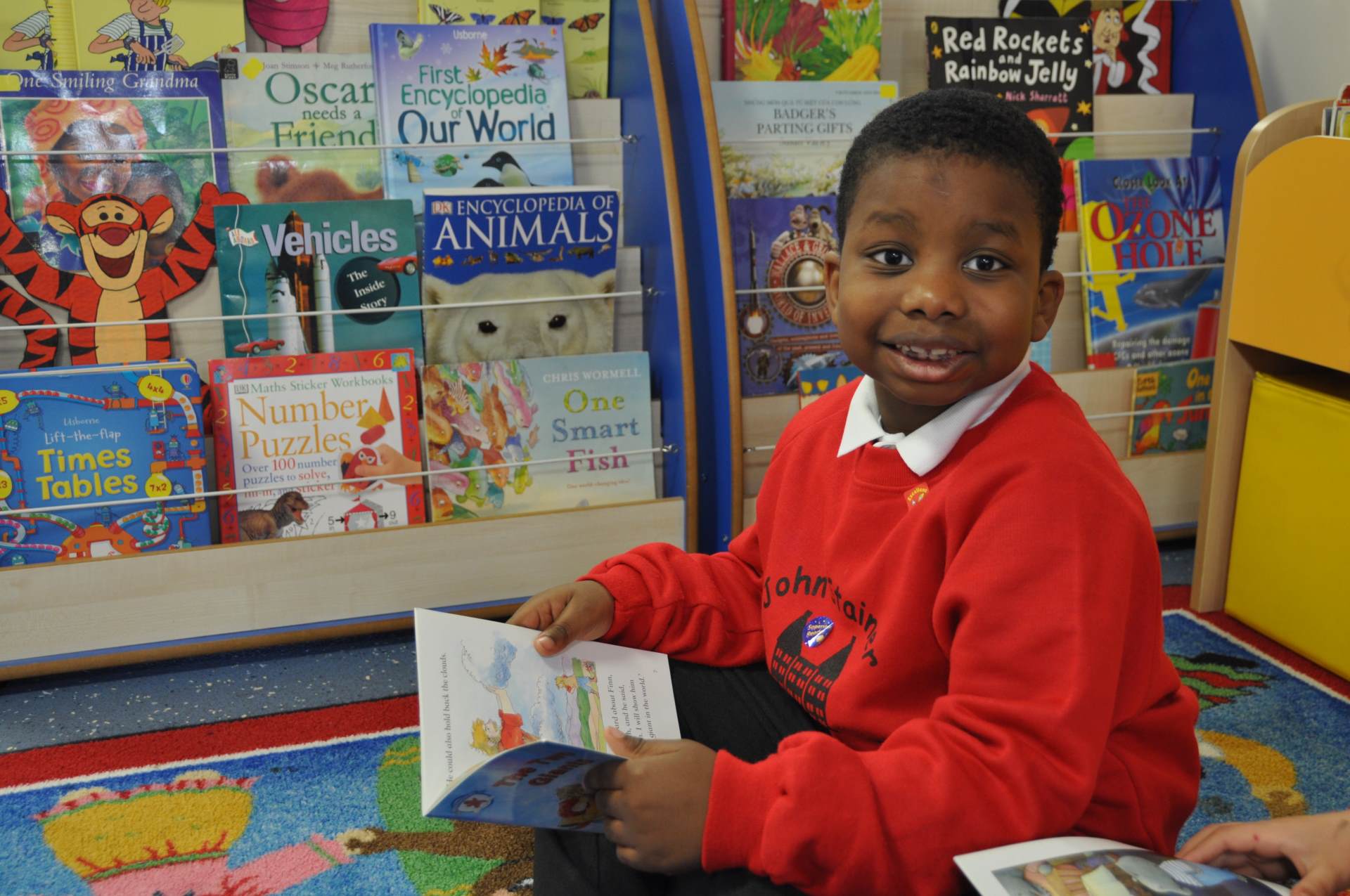
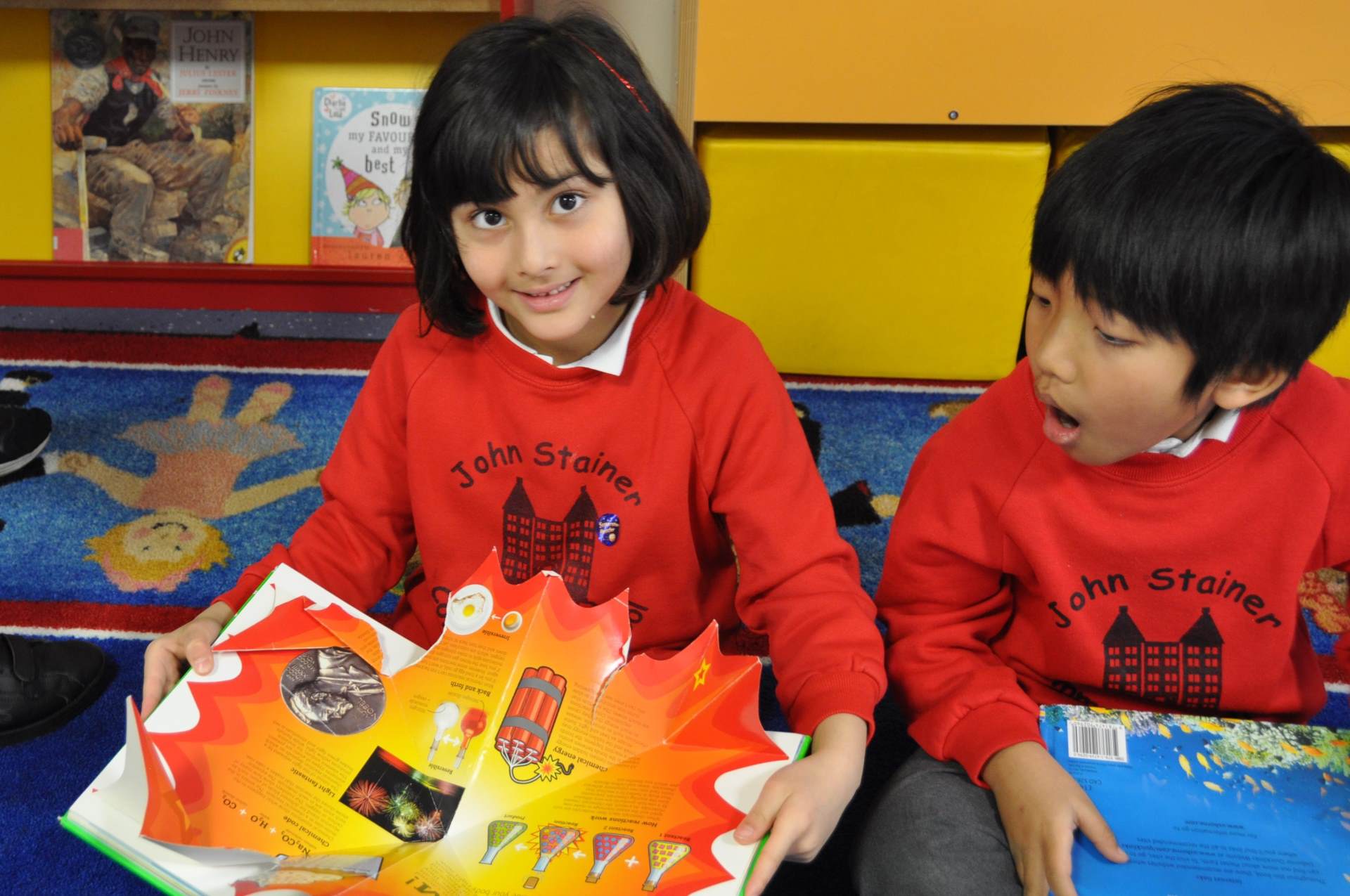
Reading for pleasure is one of the most important indicators of your child’s future success. We encourage children to read for pleasure as much as possible!
What we teach
At John Stainer we teach to the new National Curriculum for English, and the Early Years Foundation Stage Curriculum.
We have developed our own teaching framework to enable our children to learn in a rich and progressive way. Every term children make progress with their speaking, reading and writing through carefully-planned teaching sequences.

Teaching Writing
At John Stainer School we use the ‘Talk for Writing’ approach developed by Pie Corbett to teach children how to be effective writers. We teach essential reading skills through the use of high-quality literature. Teachers then develop children’s skills through the study of stories and other types of writing. Children read, write and perform poetry throughout the year to stimulate their curiosity and use of language. Talk for Writing centres on the belief that if children cannot say something, then they will not be able to write it. It enables children to imitate the language they need for a particular topic orally before reading it, analysing it, and then writing it down.
Children learn and internalise a new story or model text using a text map to guide them. They imitate new language patterns, and learn the structure.
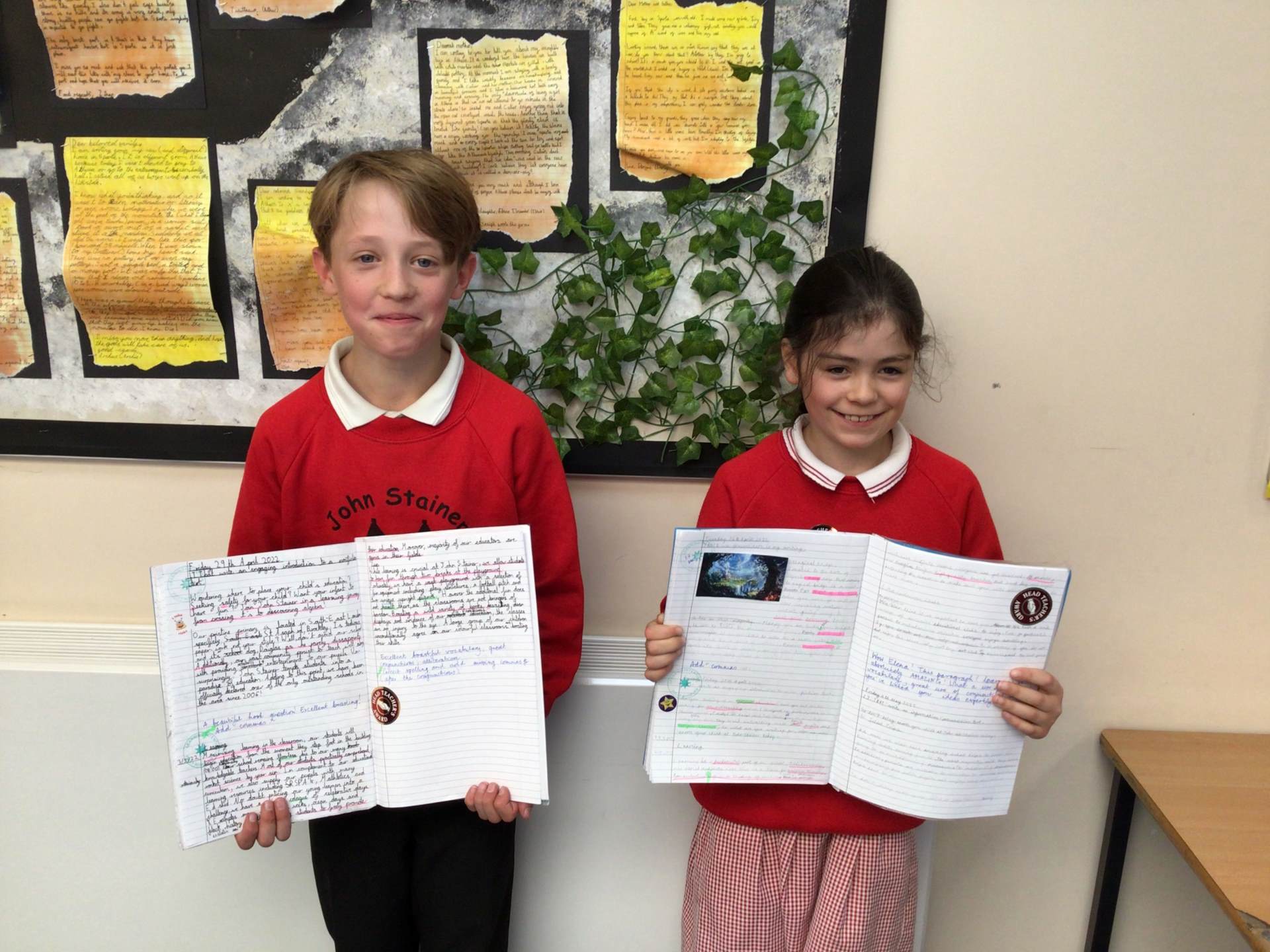
Together the class 'read as writers' and borrow the tips and tricks to build their own writer's toolkit.
The teacher demonstrates how to write down a new version of the story, exploring language and developing characters, settings and events, before the children have a go for themselves. They have lots of ideas!
We use the Talk for Writing approach in our non-fiction writing too. It lets us experiment with language patterns and ideas so that we can be really confident about writing in different genres.
Spelling, Punctuation, Grammar and Handwriting

Spelling, grammar and handwriting are vital skills which enable children to become confident and proficient writers. We try hard to teach punctuation and grammar in context so the children can really understand why and how we can use these tools to good effect in our writing.
We teach the important skills of spelling and handwriting discretely, and ask that you support us in this at home.
We teach the printed alphabet in the Early Years, moving through pre-cursive (with ‘flicks’) in KS1 aiming for fully joined cursive writing once the child is ready in KS2.
Encouraging correct grip and letter formation is essential, and we ask you to encourage this at home. As children learn new letters, we encourage them to form them correctly, as it is so much easier learn good habits early than correct poor habits later. You can find our handwriting policy here and our school handwriting style and letter families here.
Teaching Reading
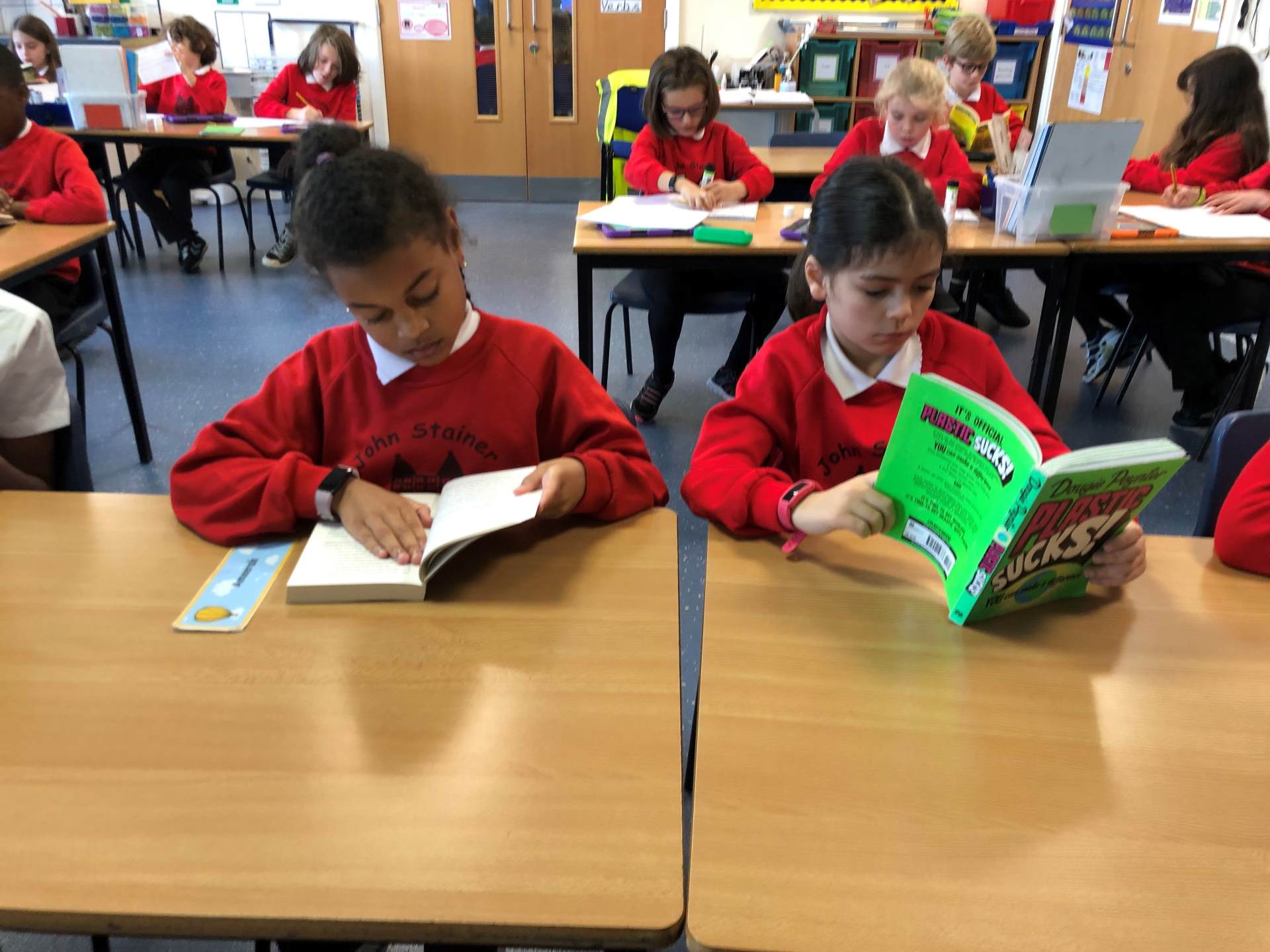
Reading comprehension is taught to ensure that children understand what they are reading. This happens informally when hearing individual children read and through class discussion in all subjects.
In Key Stage 2, the Destination Reader programme is used to support the teaching of reading in Key Stage 2. This is a pedagogical based approach to teaching reading through engaging, structured sessions that support children to read with greater understanding, enjoyment and purpose. It involves lessons incorporating whole class modelling prior to the children applying these skills through partner work and independent reading. Children deepen their understanding of the texts they read through the systematic use of a series of strategies and language stems.
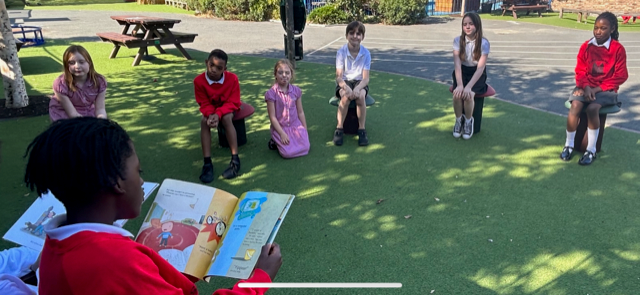 Children are taught learning behaviours which allow them to explore literature together, develop shared understanding of texts, discuss and share their ideas and opinions and analyse literature and co-construct meaning and connections. These learning behaviours are supporting and actively listening to others, discuss and explain our ideas and take responsibility for our own and our group’s learning. These behaviours are taught and practised and used in every Reading lesson and across the curriculum. They support children to engage, being active learners, recognise the value of everyone’s contribution / input in lessons and take responsibility for their learning.
Children are taught learning behaviours which allow them to explore literature together, develop shared understanding of texts, discuss and share their ideas and opinions and analyse literature and co-construct meaning and connections. These learning behaviours are supporting and actively listening to others, discuss and explain our ideas and take responsibility for our own and our group’s learning. These behaviours are taught and practised and used in every Reading lesson and across the curriculum. They support children to engage, being active learners, recognise the value of everyone’s contribution / input in lessons and take responsibility for their learning.
The program covers seven key skills identifies within the national curriculum to support the reading and understanding of a wide range of texts. These are:
- Predicting
- Making connections
- Asking questions
- Evaluating
- Inferring
- Summarising
- Clarifying
While children read their book with their partner, they are encouraged to stop and have discussions in a respectful way using the learning behaviours they have learned, and also through addressing a variety of these skills, some of which will be being specifically teacher taught using sentence stems in the same way.
Children who may find the class text difficult to access independently are supported by working with an adult or may have a more accessible text to use to apply the skills being modelled / developed.
Intent
The aim for our English curriculum is for our children to:
- Embrace language and literature.
- Build the skills and knowledge that children need to communicate clearly and effectively through speaking and writing.
- Explicitly teach children the skills to learn to read and write with confidence. We prioritise high quality linguistic phonics as the primary strategy for teaching children how to decode to read and segment to write.
- Foster a love of reading. Our school promotes reading at school, at home, through the curriculum and beyond.
- Develop confident and successful readers. Reading widely for pleasure and purpose is modelled and encouraged at every stage.
- Build the children’s vocabularyand encourage them to choose words with great care. We deepen the children’s experience of language by intentionally teaching vocabulary.
- Develop children’s critical thinking about texts and wider issues.
- Empower children to express their thoughts and feelings through drama and writing.
- Equip children with the language and grammatical structures to share their knowledge across the curriculum, writing for different purposes and audiences.
- Invite children to be imaginative and deeply observant of objects, thoughts, feelings and memories.
- Lay the foundation for future learning in all areas of the curriculum and beyond.
Implementation
Reading for pleasure
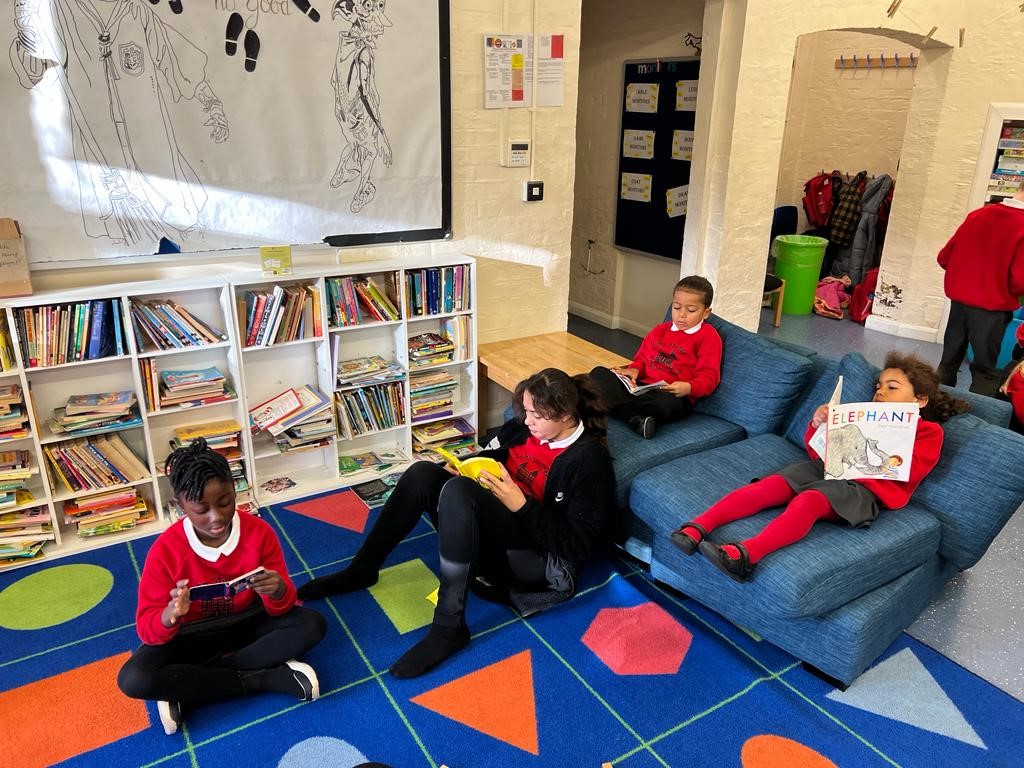
Reading for pleasure is promoted in every classroom. Children are encouraged to read for pleasure and this is celebrated in weekly Achievement Assemblies. There is a wide range of reading material available: book corners have carefully selected literature which all children can access to read in school and take home. Teachers and children are encouraged to recommend reading materials and share ‘good reads’ as part of weekly planned reading for pleasure time. Read aloud time is timetabled daily in all year groups to promote a love of reading and expose children to a wide range of topics and ambitious vocabulary. Children all have time to be read to by an adult and time to read with or to an adult so they feel valued as a reader.
Foundations for phonics in Nursery
We provide a balance of child-led and adult-led experiences for all children that meet the curriculum expectations for ‘Communication and language’ and ‘Literacy’. These include:
- sharing high-quality stories and poems
- learning a range of nursery rhymes and action rhymes
- activities that develop focused listening and attention, including oral blending
- attention to high-quality language.
- We ensure Nursery children are well prepared to begin learning grapheme-phoneme correspondences (GPCs) and blending in Reception.
Phonics / Decoding
Children make a strong start in Reception. We build from a shorter 10-15 minute lesson, with additional daily oral blending games, to the full-length lesson as quickly as possible. All lessons are carefully planned using the Sounds Write approach so children can secure their code knowledge, develop their blending and segmenting skills and apply these to accurately read and write words.
Children continue to have daily phonics lessons in Year 1 and 2 where they continue to develop their understanding of the phonetic code and secure their knowledge of the extended code and strategies to read and write longer words.
Assessment for learning happens in all stages of the teaching cycle. Any child who needs additional practice has keep-up support, with a trained staff member. Keep-up sessions match the structure of class teaching, and use the same procedures, resources and mantras, but in smaller steps with more repetition, so that every child secures their learning.
- We timetable phonics lessons for any child in KS2 who is not secure in their phonetic knowledge. These children urgently need to catch up, so the gap between themselves and their peers does not widen. We use the Sounds Write assessments to identify the gaps in their phonic knowledge to ensure they are getting targeted support to close the gaps in their knowledge.
In KS2, children use their phonics knowledge (taught in the earlier years) as a foundation to build and develop their decoding skills. All children have the opportunity to read to an adult regularly who sets individualised targets for their reading and support them in choosing books that are at the correct reading level for their ability.
Teaching Reading (comprehension)
Reading comprehension is taught to ensure that children understand what they are reading. This happens informally when hearing individual children read and through class discussion in all subjects.
In Key Stage 2, the Destination Reader programme is used to support the teaching of reading in Key Stage 2. This is a pedagogy-based approach to teaching reading through engaging, structured sessions that support children to read with greater understanding, enjoyment and purpose. It involves lessons incorporating whole class modelling prior to the children applying these skills through partner work and independent reading. Children deepen their understanding of the texts they read through the systematic use of a series of strategies and language stems.
Children are taught learning behaviours which allow them to explore literature together, develop shared understanding of texts, discuss and share their ideas and opinions and analyse literature and co-construct meaning and connections. These learning behaviours include supporting and actively listening to others, discussing and explaining our ideas and taking responsibility for our own and our group’s learning. These behaviours are taught and practised and used in every Reading lesson and across the curriculum. They support children to engage, be active learners, recognise the value of everyone’s contribution / input in lessons and take responsibility for their learning.
The program covers seven key skills identified within the national curriculum to support the reading and understanding of a wide range of texts. These are:
- Predicting
- Making connections
- Asking questions
- Evaluating
- Inferring
- Summarising
- Clarifying
While children read their book with their partner they are encouraged to stop and have discussions in a respectful way using the learning behaviours they have learned, and also through addressing a variety of these skills, some of which will be being specifically teacher taught using sentence stems in the same way.
Children who may find the class text difficult to access independently are supported by working with an adult or may have a more accessible text to use to apply the skills being modelled / developed.
Parent / Carer Partnerships for Home Reading
- Parents/carers are invited to Reading Workshops in EYFS/KS1 to share how reading is taught and share ideas on how to support At home. They also can attend opening mornings where they see their children learning phonics in class.
- In EYFS/KS1 (and beyond where applicable) decodable reading practice books are taken home to ensure success is shared with the family.
- All children are encouraged to read at home. Reading for pleasure books go home for parents/carers to share and read to or with children. All children have Reading Records to record their thoughts about what they have read. These are checked regularly by staff and if there are concerns a child may not be reading, staff contact parents/carers to offer support and guidance.
Reading Leadership
Because we believe teaching every child to read is so important, we have an English Leadership Team that drives the reading curriculum in our school. This team is highly skilled at teaching phonics and reading, and they monitor and support our teaching team, to ensure that everyone teaches with fidelity to the Sounds Write and Destination Reader programmes.
Comprehension (understanding)
Comprehension is also explicitly taught in Reading lessons. Comprehension includes:
- retrieval of information
- prediction
- deduction
- inference
- analysing
Through the Destination Reader programme children have the opportunity to develop their comprehension skills, expressing their opinions and commenting on the author’s work.
Guided Reading Lessons
Guided reading lessons are taught through weekly short texts. These are carefully selected for their ambitious vocabulary and literary content. They often complement and broaden knowledge in other subjects (for example science) or are related to current affairs.mp
Impact
Our reading curriculum is of a high quality and ensures there is a clear progression. In order to measure the impact, we gather a variety of data to ensure learning has occurred and progress has been made. This information directly informs future planning and learning opportunities, allowing us to be responsive to the needs of our pupils. We measure the impact of our curriculum against the following criteria:
- reflection on standards achieved against the planned outcomes
- children can understand and apply the fundamental principles of decoding and comprehending
- children can evaluate, improve and redraft their verbal and written comprehension
- children are competent, fluent readers with a love for literature
Monitoring and Measuring Impact of Phonics (Decoding attainment)
Assessment is used to monitor progress and to identify any child needing additional support as soon as they need it.
Formative assessment is used to monitor progress and to identify any child needing additional support as soon as they need it.
Assessments are used daily within class to identify children needing support or challenge. Staff also assess gaps, address these immediately and secure fluency of GPCs, words and spellings.
Summative assessment is used:
- each term to assess progress, to identify gaps in learning that need to be addressed, to identify any children needing additional support and to plan additional support that they need.
- by the Reading Leader and scrutinised through the Sounds Write assessment programme, to narrow attainment gaps between different groups of children and so that any additional support can be put into place.
Statutory Assessment
- Children in Year 1 sit the Phonics Screening Check. Any child not passing the check continues to get targeted support to catch up and keep up, and re-sits the check in Year 2.
Ongoing assessment for catch-up
- Children in KS2 who are not secure in their phonetic code are assessed through their teacher’s ongoing formative assessment as well as through regularSounds Write assessments, as part of their targeted catch-up interventions.
Beyond the curriculum
World Book Day is so much fun at John Stainer. Do you recognise these book characters?

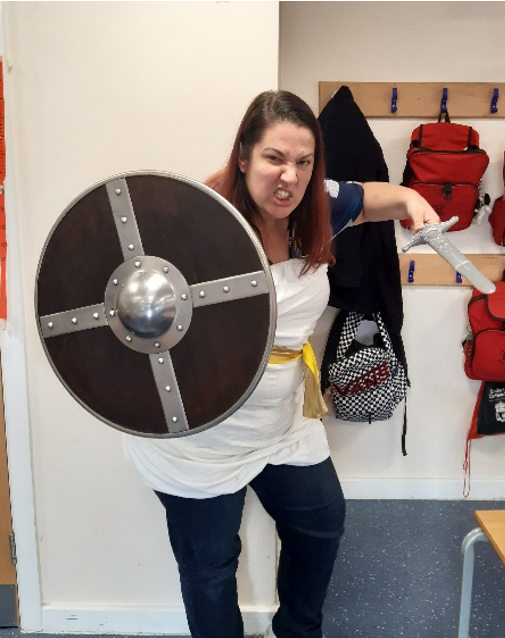
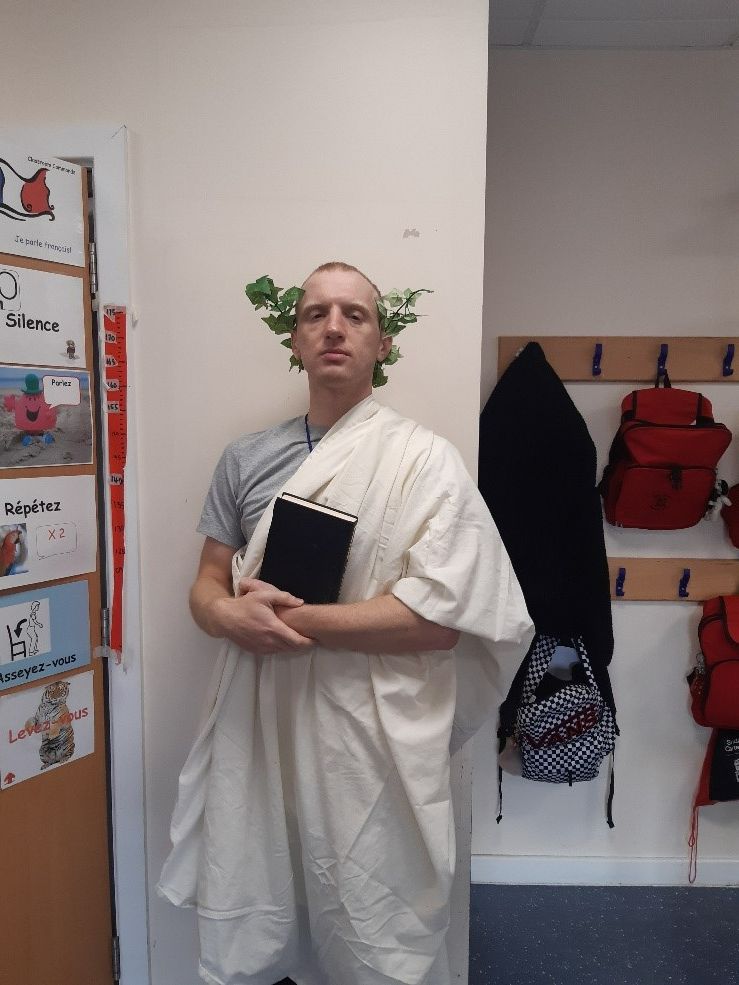
Recognising our school values in Reading
Values Oscars
Each year we host our Values Oscars where the children choose a book character who has demonstrated the chosen value in a reading book of their choice. The children write a brief explanation on why their chosen book character deserves recognition and should win. The winning characters are revealed after nominations are shortlisted and whole school voting has taken place in the ceremony. We have a lavish and spectacular Oscar Star Award Ceremony, to which parents, children and staff wear their finery, glitz and glamour.
Staff dress in role, to represent these great characters who all have their special moment on the red carpet. Winners receive a trophy (and thunderous applause).
We were so excited to welcome James Carter to John Stainer School. He inspired us with his poetry readings and workshops.
Join us at our regular poetry shows. Every class performs a poem that they have learned.
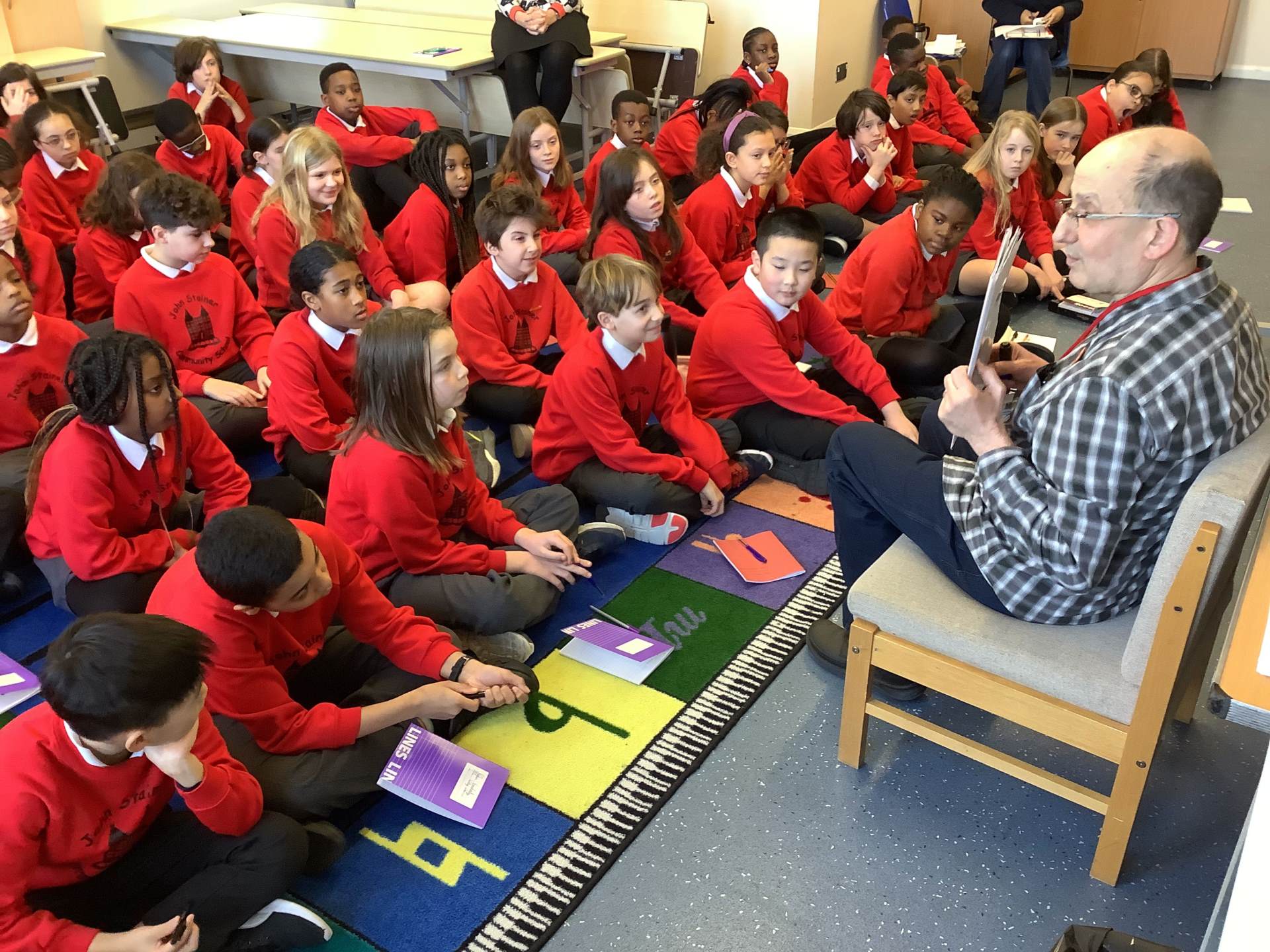
Father Christmas loves sharing stories when he comes to visit.
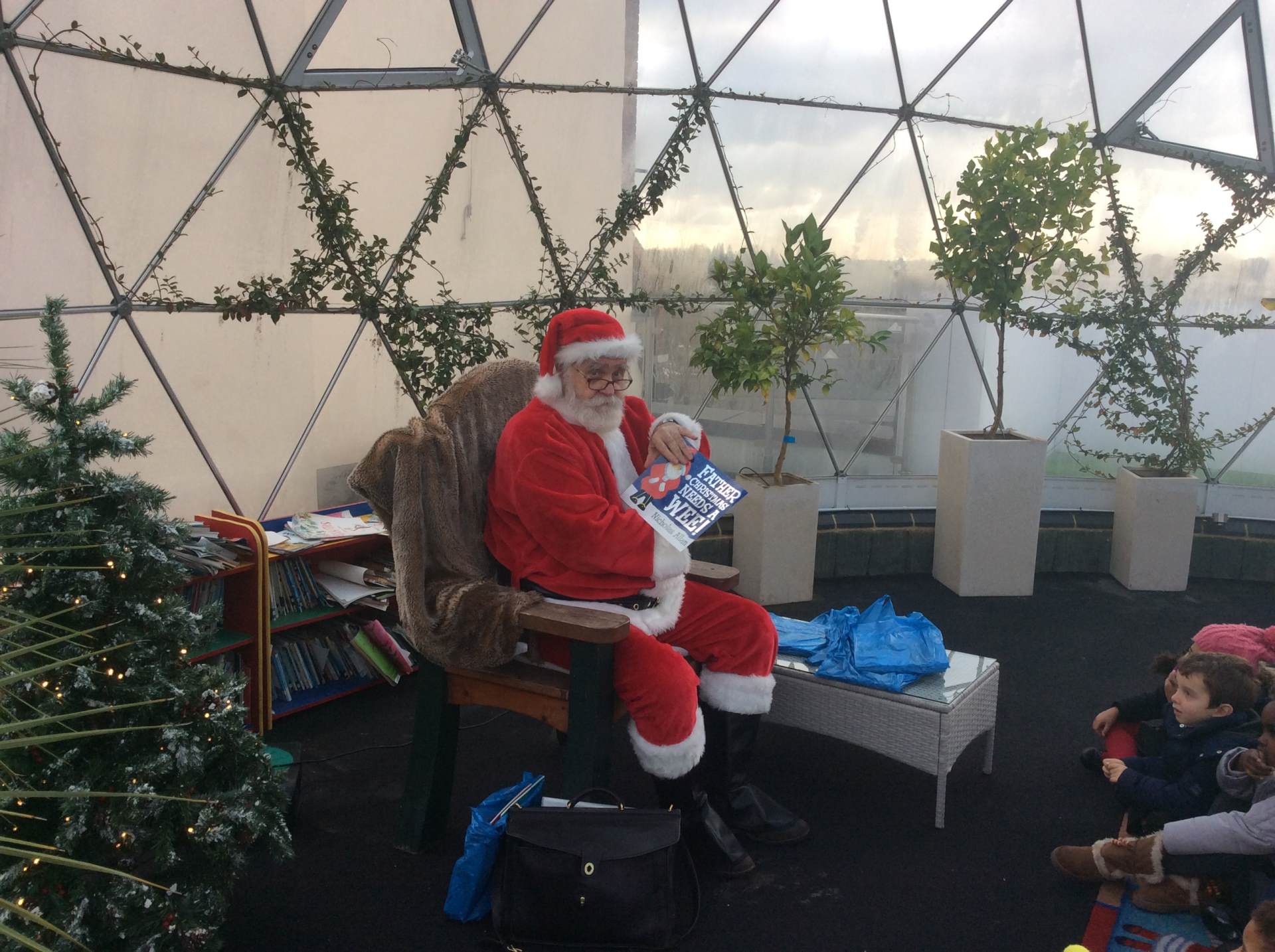
We love to welcome and work with visiting authors and poets. Here are Oladele and Louisa from Kunda Kids who came to share their wonderful books about Africa’s ancient history and culture.
How to help your child at home
Home support is key to reading success and we ask that you read with your child every day. Reading aloud should be the first thing you start and the last thing you give up with your children.
Aside from being a fantastic shared experience, it teaches the essential skills of prediction, inference and deduction. It is the best way to develop your child’s language and love of learning. Do it every day, and don’t stop when your child is able to read.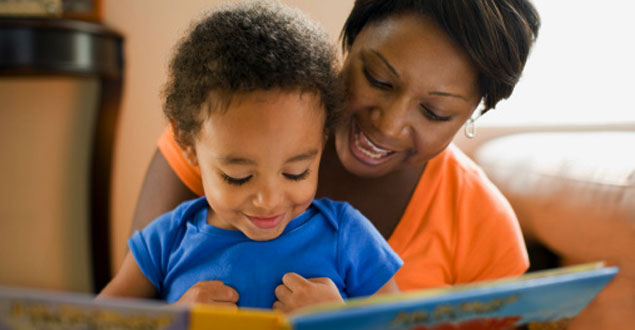
Listening to audio books together, in the car or at bedtime is a great way to enjoy literature without turning a single page.
The Sounds-Write programme that we follow in school has a fantastic app for ipads which you can use to support your child's learning.

